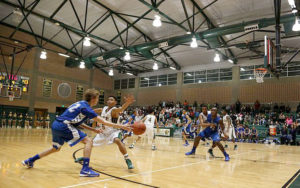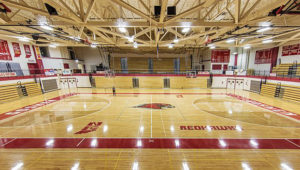A blue chip program without blue chip players
Good teams don’t always need to be loaded with seniors. Last season our team was 28-4 and we started two freshmen and two sophomores with just one senior on our team.
Another comment I constantly hear is, “We don’t have any basketball players at my school.” Over the past seven seasons, our team carries a 167-54 record, won five straight district titles and has been to the regional finals the past three years — all with no Division I, Division II, Division III or NAIA players. As a matter of fact, we’ve only had one player make a low level junior college team.
 While I’ve been blessed to coach some wonderful young girls who give us their all, historically they do not aspire to play basketball in college. However, good programs should never fall off the map. Sure, you might not compete for a state championship every season, but you can always compete.
While I’ve been blessed to coach some wonderful young girls who give us their all, historically they do not aspire to play basketball in college. However, good programs should never fall off the map. Sure, you might not compete for a state championship every season, but you can always compete.
Your team should compete consistently, regardless of the players coming through your program, and the keys to success are basic. I refrain from saying simple or easy, because it’s hard. It’s tiring. It’s demanding. But it’s something everyone can do if they are willing to work hard and commit.
Don’t misinterpret what I’m saying. We have very good high school basketball players, and in my heart, all of my players are “blue chippers.” We have an amazing group of young ladies we’ve had the privilege of coaching. You must embrace coaching the players you already have. You don’t have to raid the local AAU teams to win.
Here are some suggestions to help put a system in place that gives you a chance to be successful.
1. Choose staff wisely.
Depending on where you are, circumstances can vary. Do your best to find loyal and hardworking people.
One of my first hires was a young football coach who had never played or coached basketball. But he was a great guy and worked his tail off, so I was confident I could teach him the rest. He fit in great with our program and did well.
I currently have four assistant coaches on my varsity team. My only full-time coach is a former player, who I signed when I was a college coach. I trust her with my life, and she is invaluable to our program. I could quit tomorrow and our team would be fine.
If you are ever lucky enough to hire one of your former players, it’s usually a great situation. I’ve been fortunate to have four over the past few seasons.
I also have two full-time attorneys who coach with us for free, because they love it. One guy can only be present on game day, but he has a great understanding of the game and gives me an extra set of eyes on the court. The other one has more flexible hours and is a fitness junkie — guess what he does.
Our fourth assistant is a young lady who was dying to coach, so we brought her in last season. She has a great relationship with the kids and was a good addition.
There are plenty of willing coaches out there. Find them, treat them well, give them responsibilities and let them have fun.
2. Make it important.
Do you make basketball as important at your school as the head football coach does football?
Before I took my first high school head coaching job, the girl basketball players who were cheerleaders didn’t have to attend basketball practice until after the football season. They had no summer workouts, and as a direct result, they never had a season with more than four wins.
We came in and changed the entire culture of the program. Our numbers dropped at first, but within two years, we were winning 20 games a season and going to the playoffs.
3. Don’t insult players.
Your players don’t want to be treated like little kids — treat them like athletes. We expect our players to be able to conduct themselves as proper young ladies off the court. However, when they cross the line, we let them know. We make a point of taking two team pictures for our media guide: one picture in uniform and one in Sunday dress. This is to illustrate the fact that they can be professional while also being tough and competitive.
Our young ladies embrace the idea of being student-athletes. Young people want to be disciplined, and they will give you what they can. They just need to be challenged while having a good understanding of what you expect from them.
4. Find a practice team.
This tip is specifically for girls programs. The top women’s college basketball programs have a group of male students that they practice against. It’s important to put together a talented group of players to complete against your team and make it better.

While we do not have a male practice squad, we find that the boys junior varsity team competes hard against us. Depending on your team’s skill level, you may need to use the eighth-grade boys and work your way up. It’s no disrespect to your ladies, but boys are typically bigger and faster than girls.
In the beginning, there may be a little silliness. Stress to them the importance of this. This is the only way our starters will ever see the type of speed they’ll see in a real contest.
5. Basketball takes commitment.
If you just plan on working some of the time, plan on losing a lot of the time. You should know what your high school association allows, and work whenever permitted to do so.
I fully understand that 99 percent of my players will not be playing college basketball, so I try to give them some balance. I understand I can’t demand the same things I did from my college players. But we do work in the offseason. We have a very short spring. We work the entire month of June, and we condition for six weeks leading up to the season.
Don’t waste your time, and maximize every minute — the season is long enough. We don’t practice on the weekends, unless absolutely necessary. I feel like if we are organized, and use every minute of our two hours of practice, we can get everything covered during the week.
6. Make players comfortable.
When you decide what system you are going to run, make sure you develop it around your personnel. Defensively, we never want to have our players in a 1-on-1 situation. We have “built-in help” on everything, which keeps us from being exploited by mismatches.
On offense, we run a system where players shoot from where we want them to shoot. We put them in the best possible position to succeed. If we graduate a left-handed post player, and move up a right hander, we will literally flip our sets to the opposite side.
You must do skill development every day so your players will improve and ultimately go in either direction. But during games, keep them in their comfort zones as much as possible.
7. Each player contributes.
Set standards and hold every player accountable. Some players are better shooters than others, while other players are quicker or faster. However, there are some things that cannot be compromised.
What areas in your program are essential? For our team, every player must challenge every shot, look to block out every time, take good shots every possession and give maximum effort.
8. Make the program stand out.
Do things with your team that makes it different from other programs.
We have a media guide that is not only impressive, but also a good fundraiser. We do community service projects, such as charity runs and visiting senior homes. Think of ways to get your team together away from basketball. It will increase your fan base, develop camaraderie and help the players grow as people.
9. Cover all bases.
I think it’s important that you drill every possible scenario you can before games. Give your players an idea of what they will see and try to get them in the right position. How do you attack a 2-3 zone compared to a 1-3-1? Can you break a press without a good ball handler? What do you do against a box and one?
This season, we lost in the regional finals to a team we had beaten three times. One of the key plays of the game came right before the half. Our opponent had to go the length of the floor with 1.2 seconds left. They passed it in, dribbled twice, passed it again and launched it from half court and scored. The clock operator never started the clock.
You better believe we’ll be practicing defending that this season. Have you considered that scenario? We didn’t, but we will now.
Basketball, like any sport, has its challenges. Some years you will have better players than other years.
I’ve finally got a couple players who anticipate playing on the next level. However, as the leader of the program, you must have a plan regardless of your talent. I truly believe that if you touch on the things mentioned here, you’ll have a chance and your program will get noticed. Then, as your program grows, you’ll get one or two players who take you to the next level.









